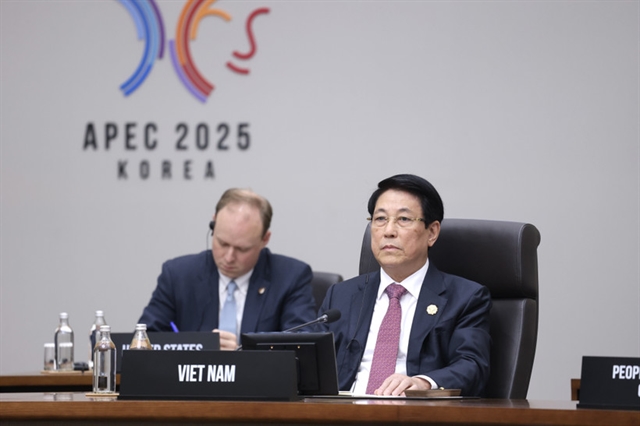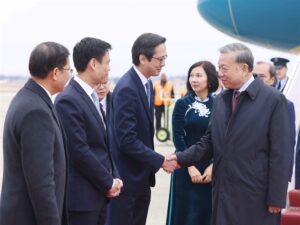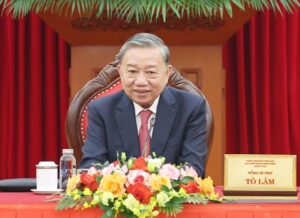President Lương Cường Proposes Major Cooperation Directions at 32nd APEC Economic Leaders’ Meeting in Gyeongju

Gyeongju, The Gulf Observer: State President Lương Cường of Việt Nam proposed several key directions for future cooperation within the Asia-Pacific Economic Cooperation (APEC) while addressing the second plenary session of the 32nd APEC Economic Leaders’ Meeting held in Gyeongju on Saturday morning.
In his address, President Cường noted that the world is undergoing rapid transformation, driven by breakthrough scientific and technological advances alongside profound cultural, social, and environmental shifts. He emphasised that these developments require APEC economies to respond proactively and strengthen cooperation to seize opportunities and overcome emerging challenges.
Highlighting the fast-paced evolution of artificial intelligence (AI), the Vietnamese leader proposed several major orientations for APEC cooperation to foster a more inclusive, sustainable, and human-centered growth model.
He called for APEC members to build a shared strategic vision for developing an innovation ecosystem and promoting leadership in the digital economy and AI governance. This includes the creation of standards and regulations to balance business innovation with the legitimate interests of people and social progress, while ensuring equal opportunities among economies.
President Cường also underscored the importance of developing comprehensive and sustainable infrastructure and establishing a safe and reliable digital ecosystem to support regional digital economic growth.
He further highlighted the significance of mutual trust as a foundation for cooperation, stating that such trust is vital for building a dynamic, modern, and prosperous Asia-Pacific region.
Sharing Việt Nam’s perspective, President Cường reaffirmed that science, technology, innovation, and digital transformation are considered the cornerstones of Việt Nam’s next development phase. He noted that innovation should be embraced by all sectors and citizens, requiring the active participation of all levels of government, industries, and communities.
The plenary session brought together leaders and heads of delegations from 21 APEC member economies, who reiterated their collective determination to strengthen regional resilience, pursue sustainable growth, and ensure shared prosperity for all.
In light of ongoing global uncertainties, participants recognised APEC’s crucial role as the leading regional platform for economic integration, innovation, and collaboration. They reaffirmed the importance of trade and investment as key drivers of development and prosperity, and pledged to deepen regional economic integration, enhance connectivity through infrastructure, institutions, and people-to-people exchanges, and support small and medium-sized enterprises.
The leaders also agreed on the need to advance trade facilitation, increase transparency, promote paperless trade, and reinforce efforts to maintain resilient supply chains across the region and beyond.
To prepare for the digital transformation era, the meeting underscored that scientific, technological, and AI advancements must serve humanity. Leaders encouraged voluntary information sharing on digital policy and technology governance, the development of a secure and accessible AI ecosystem, and investments in energy-efficient and environmentally friendly infrastructure.
The meeting reaffirmed APEC’s commitment to implementing the Internet and Digital Economy Roadmap, enhancing member economies’ capacity in digital transformation, and narrowing the digital divide to ensure that all citizens benefit from technological progress.
Addressing shared challenges, the leaders vowed to strengthen cooperation to tackle issues such as energy and food insecurity, natural disasters, and climate-related events. They also highlighted the importance of adopting a comprehensive and intergenerational approach to employment, education, health, and public finance amid demographic shifts in the region.
Concluding the meeting, APEC leaders adopted the Gyeongju Declaration, affirming their strong commitment to fostering new growth drivers, leveraging the forum’s potential, and working toward an open, dynamic, resilient, and peaceful Asia-Pacific community for the prosperity of all and for future generations.
The leaders also endorsed the APEC Artificial Intelligence Initiative and the APEC Collaborative Framework for Demographic Changes to enhance cooperation in response to emerging global trends.
APEC members congratulated the Republic of Korea for successfully hosting the 32nd APEC Economic Leaders’ Meeting and the APEC Year 2025, and extended congratulations to China for assuming the role of host for APEC Year 2026.


